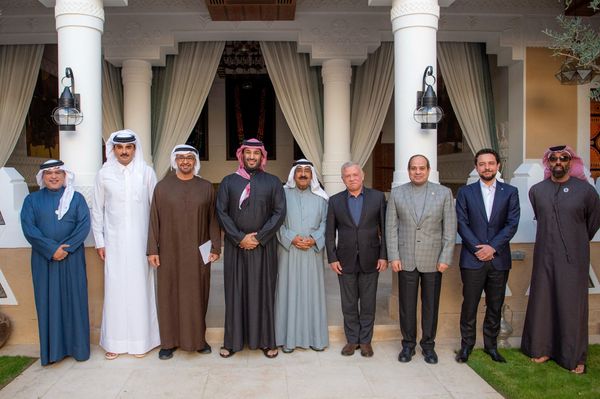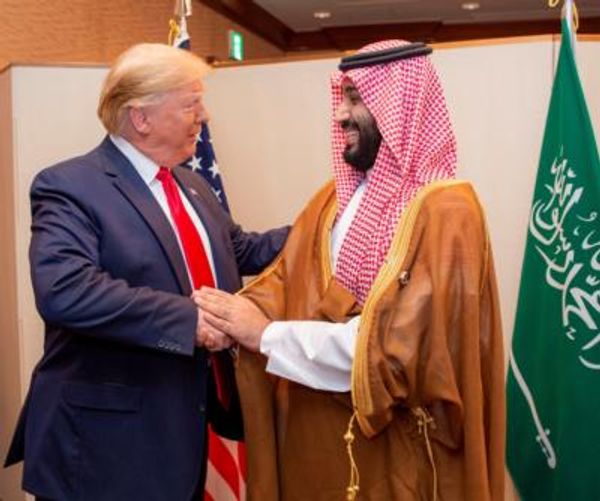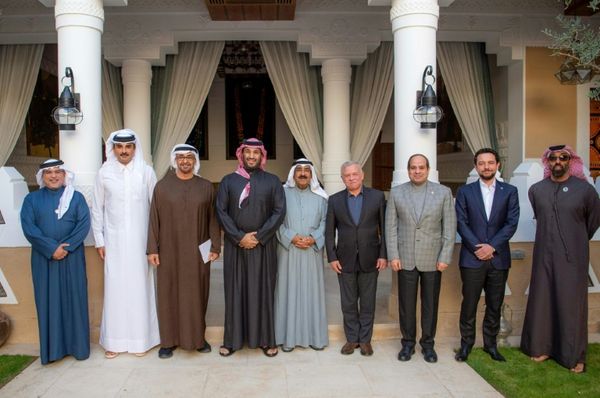
Saudi Arabia has suddenly experienced a diplomatic awakening after lukewarm engagement with the conflict in Gaza. Today, leaders of Egypt, Jordan, Qatar and the United Arab Emirates will gather in Riyadh to discuss Donald Trump’s proposal for a US takeover of Gaza. (Keen to be viewed as a global deal maker, Saudi Arabia will also be hosting negotiations over Ukraine this week.)
Crown Prince Mohammed bin Salman was alarmed by Trump’s outrageous “Riviera plan” to reconstruct Gaza following eviction of its people to neighbouring countries. Alongside Arab leaders, he hopes to propose an alternative plan with the establishment of a Palestinian state with East Jerusalem its capital at its core. The crown prince has insisted that there will be no normalisation of Israel without a Palestinian state.
In the short term, he may succeed in preventing the eviction of Palestinians from Gaza and their proposed resettlement in Egypt, Jordan, and even Saudi Arabia. The summit promises to raise enough funds for reconstruction while leaving Palestinians in temporary shelters on their own land.
The urgent and more challenging item of the summit’s agenda will be finding an alternative power to replace Hamas as the government of Gaza. Prince Mohammed is a sworn enemy of several Islamist movements, but his disdain for Hamas is more profound. He considers it responsible for derailing his plan to complete normalisation with Israel after 7 October 2023.
The crown prince’s determination to normalise relations with Israel springs out of domestic interest. Saudi Arabia would like to see the transfer of Israeli technology, military equipment, intelligence and develop closer trade relations. More importantly, he hopes such a move would lead to closer security ties with the United States.
In the long term, Prince Mohammed is unlikely to be successful for two reasons. First, Israel will prove a major obstacle, given that Benjamin Netanyahu unequivocally refuses to accept Palestinian statehood and sovereignty.
Second, an alternative plan that completely sidelines Hamas has very little chance of succeeding. The political organisation may give up governance in Gaza in return for reconstruction, but it will not simply vanish. Unlike in 1982, when the Palestinian Liberation Organisation (PLO) under Yasser Arafat was pushed out of Lebanon to Tunisia after the Israeli occupation of the south of the country, Hamas is fighting on its own land. The subsequent Lebanese Christian massacre of Palestinian refugees in Sabra and Shatila after the departure of the PLO is still alive in Palestinian memory. Hamas will not accept any plan that will bring about an end to Palestine as it is imagined by several generations of Palestinian exiles around the world and the people of Gaza who endured more than 15 months of slaughter.
The Saudi alternative plan is driven by pure self-interest, namely, to mitigate against the destabilisation of several Arab regimes, itself included. Forced eviction of Palestinians will inevitably spread Hamas, its fighters and political Islam – mainly the Muslim Brotherhood – into countries that have been deliberately and successfully suppressing such ideology. None of the Arab regimes want to see Hamas fighters and their extended communities living in their countries.
The Muslim Brotherhood ideology invokes governance according to Islam, but at the same time talks about democracy. It is a global movement that appeals to many young Muslims, including Saudis, aspiring toward some kind of Islamic democratic rule, according to their own interpretation of both Islam and democracy. As such it immediately threatens monarchical rule.
Prince Mohammed has focused on economic and social liberalisation, both of which included suppressing the Muslim Brotherhood variant of Islamism. Any attempt to evict Palestinian Hamas will definitely revive political Islam.
Moreover, should Palestinians be forced to leave their territory en masse, Prince Mohammed fears the reaction of the Saudi public and being portrayed as the Arab monarch who “sold Palestine”. Saudi citizens have more solidarity with Palestinians than their regime as the latter had been indoctrinating them to be leaders among Arabs and Muslims when it suited the monarchy’s interest. Prince Mohammed has since pivoted to adopting slogans such as “Saudi Arabia for Saudis” and “Make Saudi Arabia Great”, echoing Trump and hoping to divorce Saudis from regional and global Muslim causes. However, Saudis have already internalised their religious duty to side with Arabs and Muslims. So far, Prince Mohammed has pushed to repress solidarity by jailing those who openly support or call for demonstrations on behalf of Palestinians.
It is still unclear what the governance of Gaza will look like. Despite the destruction, neither Prince Mohammed nor other Arab countries can successfully decide the fate of Gaza without engagement with the Palestinians themselves. While many Arab countries have already signed normalisation agreements with Israel, none have brought peace. In fact, the opposite has happened, for a simple reason. Palestinians themselves were sidelined. Only an agreement between Israel and Palestinians that guarantees Palestinian statehood and sovereignty will bring about a long-lasting peace. The “Saudi awakening” will pass without creating the conditions for this peace if all Palestinian factions, including Hamas, are not sitting at the negotiation table.
Madawi al-Rasheed is a fellow of the British Academy and a visiting professor at the Middle East Centre, London School of Economics. She is the author of The Son King: Reform and Repression in Saudi Arabia
Do you have an opinion on the issues raised in this article? If you would like to submit a response of up to 300 words by email to be considered for publication in our letters section, please click here.










